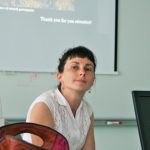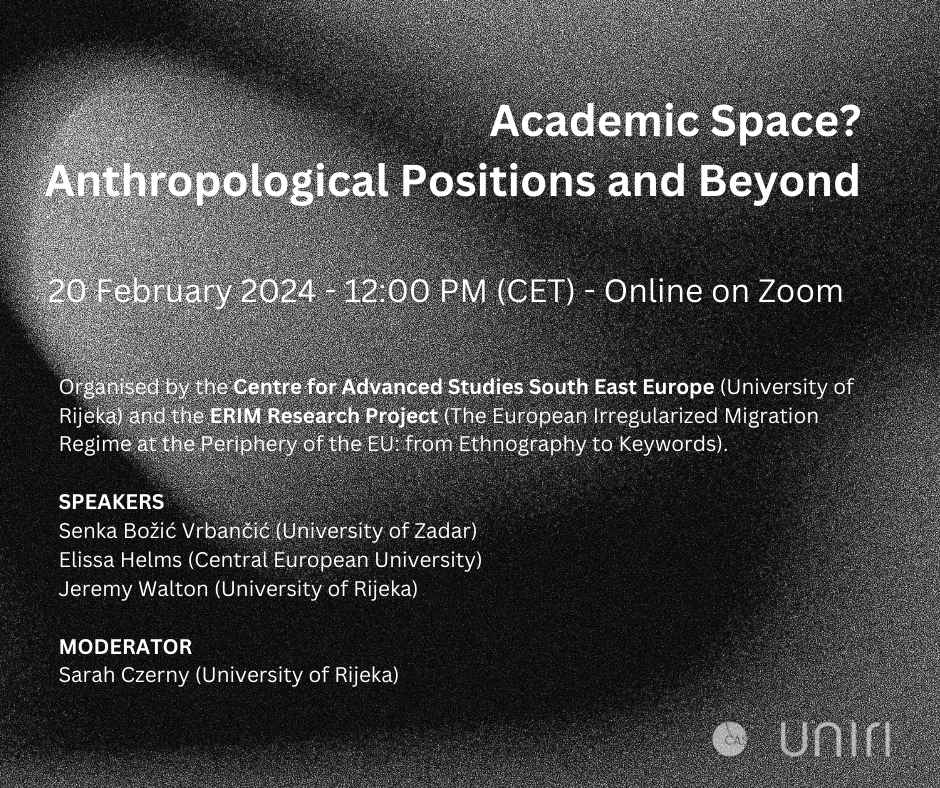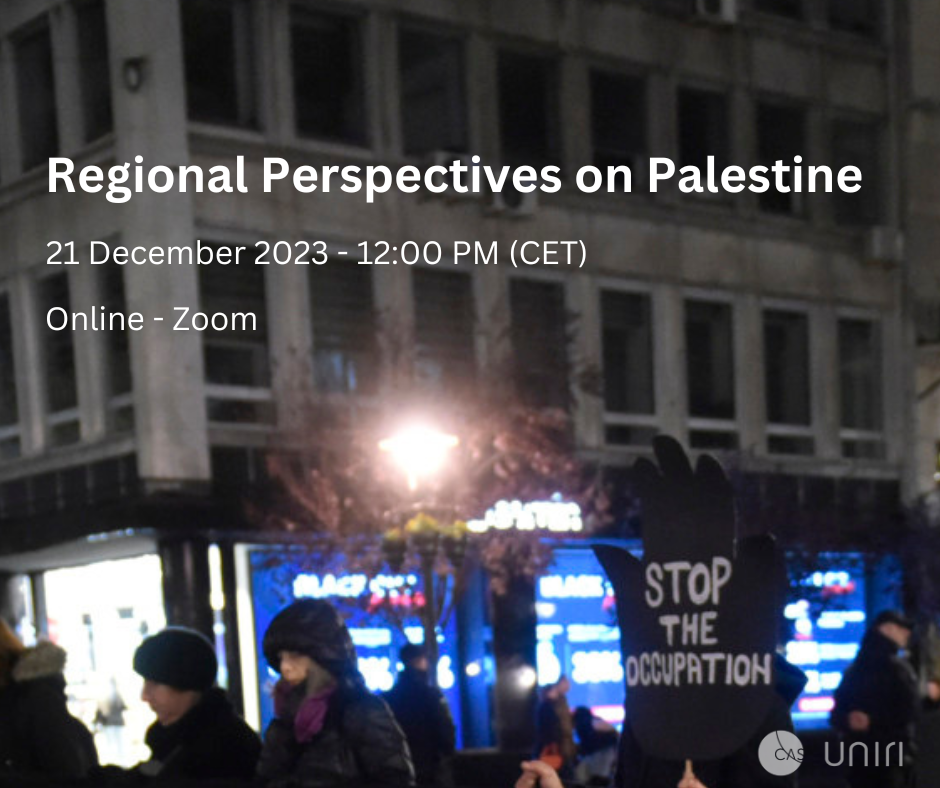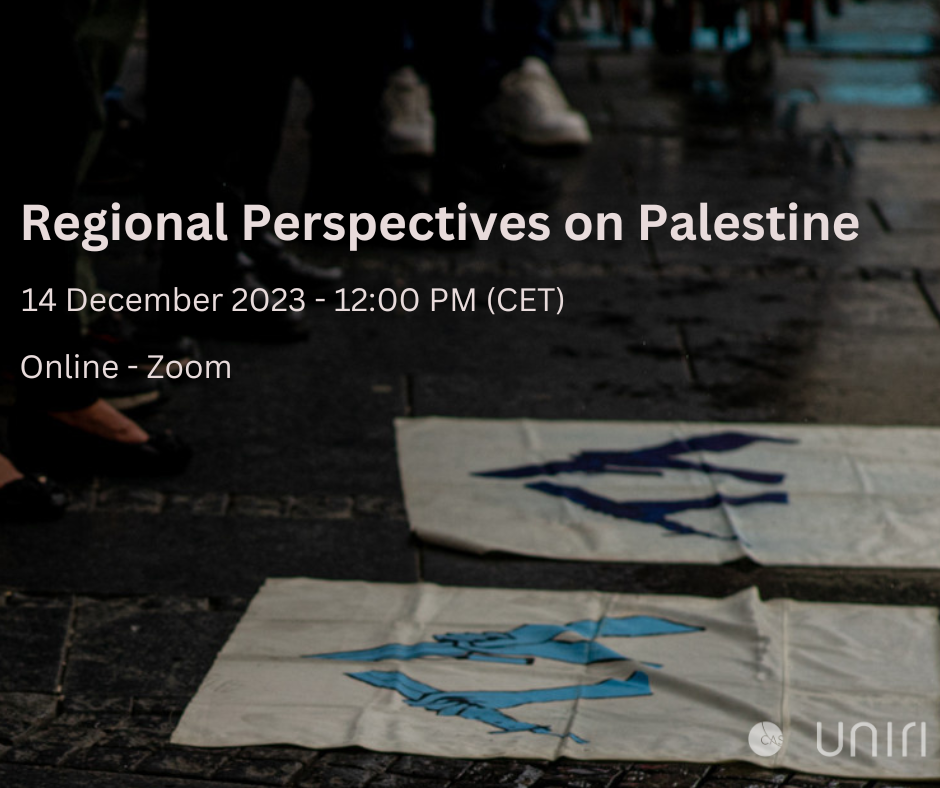“Life is all about work”: Growing food as lifestyle politics in Slovenia
Seminar was held at the University of Rijeka on May 11, 2018.
“In a global drive towards lowering production costs and maximise profits run by corporations and market institutions (Steel 2009), many agree that the global food systems need rethinking (Grasseni 2014). At the same time, various forms of food activism are taking place all over the world from local food and food sovereignty movements, slow food movements, solidarity purchase networks, community supported agriculture, seed swap events, to alternative urban provisioning such as food pooling, food banking, gleaning, freeganism, urban canners and guerrilla gardening.
Moving beyond ethical consumerism, I place the focus of my research at ethical food production. By bringing into discourse Michael Lambek’s ‘ordinary ethics’ (2010), I will look at young families that have intentionally decided to move from urban centres to grow their own food and/or set up a farm, thus placing food production at the forefront of their lifestyle. While the knowledge to the successors of traditional family farms is transmitted through socialisation, I am interested in families that had no previous knowledge of growing vegetables and/or raising animals, and the reasons that lie behind their decisions to pursue such a lifestyle. Following values-based approach to political activism (Lambek 2010), I am particularly concerned with meanings and practices these families attribute to their new lifestyle with regard to food production and dynamics of work, and how they express their concern to the world of neoliberal capitalism and its industrial corporate food systems (Sayer 2011).
Drawing on a study conducted among five families in Slovenia, I will present back-to-the-land movements in the context of food activism in Slovene case study. After providing a short historical overview of the part-time peasants, I will particularly focus on the last decade in the context of political and economic crisis in Slovenian context. Firstly, I aim to understand the rationales behind families’ decisions to produce food as a form of self-sufficiency through the concept of work. I argue that such lifestyle entails also specific dynamics of work, which is not “time purchased from the stream of life” (Henricks 2015: 5), but it also includes social dimension, typical for community-based societies. Therefore, these families represent a counter-narrative to conceptions of family life within post-industrial societies, where work is being excluded as a form of social interaction and learning, and restricted to the understanding of work as a capitalist mode of production. Secondly, by bringing the concept of ‘ordinary ethics’ into discourse on food activism, I examine the concern of these families that they are eating sufficiently good food, and that they have a self-determination of the kind of food they eat.
Moving beyond ethical consumerism, I place the focus of my research at ethical food production. By bringing into discourse Michael Lambek’s ‘ordinary ethics’ (2010), I will look at young families that have intentionally decided to move from urban centres to grow their own food and/or set up a farm, thus placing food production at the forefront of their lifestyle. While the knowledge to the successors of traditional family farms is transmitted through socialisation, I am interested in families that had no previous knowledge of growing vegetables and/or raising animals, and the reasons that lie behind their decisions to pursue such a lifestyle. Following values-based approach to political activism (Lambek 2010), I am particularly concerned with meanings and practices these families attribute to their new lifestyle with regard to food production and dynamics of work, and how they express their concern to the world of neoliberal capitalism and its industrial corporate food systems (Sayer 2011).
Drawing on a study conducted among five families in Slovenia, I will present back-to-the-land movements in the context of food activism in Slovene case study. After providing a short historical overview of the part-time peasants, I will particularly focus on the last decade in the context of political and economic crisis in Slovenian context. Firstly, I aim to understand the rationales behind families’ decisions to produce food as a form of self-sufficiency through the concept of work. I argue that such lifestyle entails also specific dynamics of work, which is not “time purchased from the stream of life” (Henricks 2015: 5), but it also includes social dimension, typical for community-based societies. Therefore, these families represent a counter-narrative to conceptions of family life within post-industrial societies, where work is being excluded as a form of social interaction and learning, and restricted to the understanding of work as a capitalist mode of production. Secondly, by bringing the concept of ‘ordinary ethics’ into discourse on food activism, I examine the concern of these families that they are eating sufficiently good food, and that they have a self-determination of the kind of food they eat.
Finally yet importantly, I suggest that these alternative lifestyles provide a critique of consumer culture and strive towards environmental sustainability and non-capitalist economic relations (Grasseni 2014; Wilbur 2014). Furthermore, I suggest that their decision to pursue alternative lifestyle can be understood as a form of ‘unclaimed activism’ or ‘lifestyle politics’ (Bennett 2006; Nolas 2017). In the face of mass industrial food production, such small-scale localised entrepreneurs and their potential alliances with local consumers represent competitors of mega farms and multinational distribution and preserve social, environmental, and economic diversity, as well as food sovereignty (Grasseni 2014: 53).”
 Barbara Turk Niskač, current CAS SEE Fellow, received her PhD in Ethnology, Cultural and Social Anthropology at the University of Ljubljana (2016), where she worked as a Junior Researcher, and is currently Adjunct Assistant Professor. She was a Visiting PhD Student at the University of Sarajevo, Centre for Interdisciplinary Postgraduate Studies and a Fulbright Visiting Scholar at the Rutgers University. Her doctoral dissertation Playing at Work, Working at Play: An Ethnographic Study of Learning in Early Childhood examined the relationship between play, work and learning in early childhood in Slovenia. Her main research interests include anthropology of childhood, anthropology of education, anthropology of work, migration and ethnic studies, sensory ethnography and visual anthropology. She is particularly interested in employing participatory visual methods in research with children and youth. Apart from academia, she also worked for International Organization for Migration (IOM – UN Agency).
Barbara Turk Niskač, current CAS SEE Fellow, received her PhD in Ethnology, Cultural and Social Anthropology at the University of Ljubljana (2016), where she worked as a Junior Researcher, and is currently Adjunct Assistant Professor. She was a Visiting PhD Student at the University of Sarajevo, Centre for Interdisciplinary Postgraduate Studies and a Fulbright Visiting Scholar at the Rutgers University. Her doctoral dissertation Playing at Work, Working at Play: An Ethnographic Study of Learning in Early Childhood examined the relationship between play, work and learning in early childhood in Slovenia. Her main research interests include anthropology of childhood, anthropology of education, anthropology of work, migration and ethnic studies, sensory ethnography and visual anthropology. She is particularly interested in employing participatory visual methods in research with children and youth. Apart from academia, she also worked for International Organization for Migration (IOM – UN Agency).



